MEDIA MENTIONS : DMS & DHMC IN THE NEWS
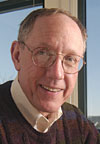 Among the people and programs coming in for
prominent media coverage in recent months
was epidemiologist John Baron. From the Washington
Post to the Los Angeles Times and CNN to NPR,
the media covered a study he led
about aspirin's effect on colon
cancer. Noted Newsweek: "Now,
scientists say, [aspirin] may also
help ward off colon cancer, at
least in high-risk populations."
The San Francisco Chronicle reported
that "Dr. John Baron of
Dartmouth Medical School said aspirin's benefits
are real but modest." And Reader's Digest issued a
caution: "Though aspirin is great, says Dartmouth's
John Baron, it has risks. Talk to your doctor
first." See page 10 for more on the study.
Among the people and programs coming in for
prominent media coverage in recent months
was epidemiologist John Baron. From the Washington
Post to the Los Angeles Times and CNN to NPR,
the media covered a study he led
about aspirin's effect on colon
cancer. Noted Newsweek: "Now,
scientists say, [aspirin] may also
help ward off colon cancer, at
least in high-risk populations."
The San Francisco Chronicle reported
that "Dr. John Baron of
Dartmouth Medical School said aspirin's benefits
are real but modest." And Reader's Digest issued a
caution: "Though aspirin is great, says Dartmouth's
John Baron, it has risks. Talk to your doctor
first." See page 10 for more on the study.
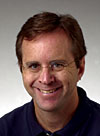 A Newsweek cover story on pain quoted a DHMC
expert for insights into "small patients, big pain."
Doctors are "rethinking the treatment of acute
pain for children who go to
emergency rooms for more common
injuries like broken limbs
or cuts that need stitches. In the
past 'you brought your kid to the
hospital. They held them down
and did something that hurt,
and you brought them home,'
says Joe Cravero, a pediatrician and anesthesiologist
who is cowriting an American Academy of Pediatrics
policy statement on pain relief in the ER."
A Newsweek cover story on pain quoted a DHMC
expert for insights into "small patients, big pain."
Doctors are "rethinking the treatment of acute
pain for children who go to
emergency rooms for more common
injuries like broken limbs
or cuts that need stitches. In the
past 'you brought your kid to the
hospital. They held them down
and did something that hurt,
and you brought them home,'
says Joe Cravero, a pediatrician and anesthesiologist
who is cowriting an American Academy of Pediatrics
policy statement on pain relief in the ER."
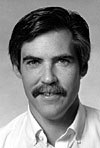 "The perils of prevention" was the headline on a
New York Times feature about some downsides of
aggressive screening practices. "'Imaging has improved
so much, we can find things we really don't
know enough about,' says Dr. William Black, a radiologist
at Dartmouth. In the face
of this uncertainty, doctors say
they must err on the side of caution
and treat practically every
tiny tumor as if it were potentially
deadly. . . . But that means
that widespread screening for
prostate and breast cancer has
resulted in huge numbers of patients suffering the
side effects of unnecessary medicine." See page 14
for a recent study on a related topic.
"The perils of prevention" was the headline on a
New York Times feature about some downsides of
aggressive screening practices. "'Imaging has improved
so much, we can find things we really don't
know enough about,' says Dr. William Black, a radiologist
at Dartmouth. In the face
of this uncertainty, doctors say
they must err on the side of caution
and treat practically every
tiny tumor as if it were potentially
deadly. . . . But that means
that widespread screening for
prostate and breast cancer has
resulted in huge numbers of patients suffering the
side effects of unnecessary medicine." See page 14
for a recent study on a related topic.
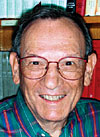 From Better Homes & Gardens, to the New York
Times, to the San Diego Union-Tribune, the word
is out that the advice to drink eight 8-ounce glasses
of water a day is all wet. A review article on
the subject last year by DMS physiologist Heinz Valtin
is still getting wide coverage. BH&G wrote that
"according to a study at Dartmouth, the '8-by-8
rule,' as it's known among nutritionists, doesn't
appear to have any real scientific basis." The New
York Times said many marathoners are "overhydrated,
having fallen for what
Dr. Heinz Valtin of Dartmouth
deems a medical myth: that dehydration
is always lurking."
And in the San Diego newspaper,
"Heinz Valtin, a noted kidney
expert from Dartmouth,
[warned that] water intoxication
and even death can result from drinking more water
than your kidneys can process."
From Better Homes & Gardens, to the New York
Times, to the San Diego Union-Tribune, the word
is out that the advice to drink eight 8-ounce glasses
of water a day is all wet. A review article on
the subject last year by DMS physiologist Heinz Valtin
is still getting wide coverage. BH&G wrote that
"according to a study at Dartmouth, the '8-by-8
rule,' as it's known among nutritionists, doesn't
appear to have any real scientific basis." The New
York Times said many marathoners are "overhydrated,
having fallen for what
Dr. Heinz Valtin of Dartmouth
deems a medical myth: that dehydration
is always lurking."
And in the San Diego newspaper,
"Heinz Valtin, a noted kidney
expert from Dartmouth,
[warned that] water intoxication
and even death can result from drinking more water
than your kidneys can process."
Debate in the scientific community regarding the rigor of space-shuttle science was fodder for a recent article in the Houston Chronicle. One of the experts who defended such work was "Jay Buckey, a Dartmouth medical professor who flew on Neurolab. . . . Buckey said NASA did several things right for Neurolab, such as tailoring the flight to fit the science and not the science to fit the flight."
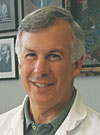 "Take two recent medical anecdotes," wrote a reporter
for the Milwaukee Journal-Sentinel. "I had
two surgeries, one on a knee and
another on a wrist, and nobody
asked me in a systematic way
how they came out. My doctors
know and I know, but no one
else knows. In the same time
frame, my son had a back operation
at Dartmouth-Hitchcock
Medical Center, a longtime leader in systematic
medicine. . . . His results, like mine, were excellent,
but his were fed into a real-time database,
while mine went into the ether." The director of
DHMC's Spine Center is James Weinstein.
"Take two recent medical anecdotes," wrote a reporter
for the Milwaukee Journal-Sentinel. "I had
two surgeries, one on a knee and
another on a wrist, and nobody
asked me in a systematic way
how they came out. My doctors
know and I know, but no one
else knows. In the same time
frame, my son had a back operation
at Dartmouth-Hitchcock
Medical Center, a longtime leader in systematic
medicine. . . . His results, like mine, were excellent,
but his were fed into a real-time database,
while mine went into the ether." The director of
DHMC's Spine Center is James Weinstein.
Ruing "a medical arms race that is spreading openheart surgery across southeastern Pennsylvania but is draining the number of patients at many programs, threatening patient safety," the Philadelphia Inquirer turned to a Dartmouth expert on the effect of volume on surgery risk. "In the largest surgical volume study ever done, John Birkmeyer, chief of general surgery at Dartmouth, found that 4.8% of Medicare patients died soon after bypasses in high volume hospitals. But the death rate jumped to 6.1% for bypass patients in the lowest-volume hospitals."
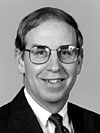 The Wall Street Journal reported that ruptured
aneurysms, "a ballooned section of a
blood vessel, . . . kill an estimated 18,000
Americans a year—more than AIDS or
brain cancer." They can be diagnosed with
"a simple test," but it's not covered by most
insurers or recommended by most doctors.
Now, however, "a large new study is being
organized by the medical schools at Dartmouth,
the University of Pennsylvania, and
the University of Pittsburgh. Initially it will
measure the prevalence of
aneurysms; a later phase
will check for a mortality
benefit from screening.
'There is reasonable
emerging evidence suggesting
it's reasonable to
screen men over 60' for
abdominal aneurysm, 'particularly if they
have a history of smoking, and anyone with
a first-degree relative with an aneurysm,'
says Jack Cronenwett, a study organizer and chief
of vascular surgery at Dartmouth."
The Wall Street Journal reported that ruptured
aneurysms, "a ballooned section of a
blood vessel, . . . kill an estimated 18,000
Americans a year—more than AIDS or
brain cancer." They can be diagnosed with
"a simple test," but it's not covered by most
insurers or recommended by most doctors.
Now, however, "a large new study is being
organized by the medical schools at Dartmouth,
the University of Pennsylvania, and
the University of Pittsburgh. Initially it will
measure the prevalence of
aneurysms; a later phase
will check for a mortality
benefit from screening.
'There is reasonable
emerging evidence suggesting
it's reasonable to
screen men over 60' for
abdominal aneurysm, 'particularly if they
have a history of smoking, and anyone with
a first-degree relative with an aneurysm,'
says Jack Cronenwett, a study organizer and chief
of vascular surgery at Dartmouth."
Noted the Miami Herald: "Blood banks are starting to adopt new anti-germ technology. 'Although the public is worried about HIV or West Nile virus, we may have to occasionally stand up and say in public or to a newspaper reporter, "That's not what we should be worrying about,"' blood safety expert James AuBuchon of Dartmouth told a recent meeting of the government's top blood advisors. 'Share with the public what the real risks are.' Topping that list: germs." AuBuchon's work was the subject of the cover feature in the Spring issue of the magazine.
Though bioterrorism remains a subject of concern, "vaccinating the entire U.S. population for smallpox in the 21st century, without signs of an attack, is a step vaccine experts call extreme," reported Newsday. "'We need a policy, but that doesn't mean that we have a general policy to immunize large numbers of people,' said Dr. John Modlin," who chairs the federal Advisory Committee on Immunization Practices. "Modlin, a professor at Dartmouth Medical School, said the vaccine is based on a live virus, and therefore a policy must be carefully crafted."
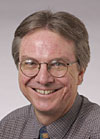 The Baltimore Sun wrote about a problem
that "cancer patients [call] chemo brain or
chemo curse . . . a sense
that their brains are in a
fog. In one study of breast
cancer and lymphoma
patients at Dartmouth-
Hitchcock Medical Center,
more than twice as
many chemotherapy patients
scored in the lower impaired range
than did patients who had radiation or
surgery. Dr. Tim Ahles, who directs psychooncology
research at Dartmouth, found
deficits even after accounting for education
differences and screening out survivors with
problems such as depression and anxiety."
The Baltimore Sun wrote about a problem
that "cancer patients [call] chemo brain or
chemo curse . . . a sense
that their brains are in a
fog. In one study of breast
cancer and lymphoma
patients at Dartmouth-
Hitchcock Medical Center,
more than twice as
many chemotherapy patients
scored in the lower impaired range
than did patients who had radiation or
surgery. Dr. Tim Ahles, who directs psychooncology
research at Dartmouth, found
deficits even after accounting for education
differences and screening out survivors with
problems such as depression and anxiety."
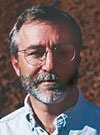 Newsday reported on "arsenic's reputation
for toxic nastiness," saying a Dartmouth
study shows "that even minuscule doses disrupt
the way hormones work. . . . 'Arsenic is
an agent of considerable
public health concern in
the United States and
worldwide,' said toxicologist
Joshua Hamilton of Dartmouth.
The elemental
metal is already known to
be outright poisonous. . . .
Now, Hamilton said, 'it's very clear that arsenic
is a potent endocrine disrupter.'"
Newsday reported on "arsenic's reputation
for toxic nastiness," saying a Dartmouth
study shows "that even minuscule doses disrupt
the way hormones work. . . . 'Arsenic is
an agent of considerable
public health concern in
the United States and
worldwide,' said toxicologist
Joshua Hamilton of Dartmouth.
The elemental
metal is already known to
be outright poisonous. . . .
Now, Hamilton said, 'it's very clear that arsenic
is a potent endocrine disrupter.'"
The London Daily Telegraph carried word of a recent "finding that some sufferers from temporal lobe epilepsy . . . seem to experience devout hallucinations that bear striking resemblances to the mystical experiences of holy figures such as St. Paul or Moses. This theory received a boost from Gregory Holmes, a pediatric neurologist at Dartmouth, who says one of the principal founders of the Seventh-Day Adventist movement, Ellen White, in fact suffered from temporal lobe epilepsy."
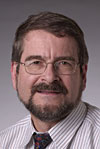 The myriad benefits of a good night's sleep
were recently touted in the pages of Reader's
Digest. "The solutions to sleeplessness are
better than ever, but it helps to understand
the nature of your problem, says Michael Sateia,
who directs the Dartmouth-
Hitchcock Sleep
Disorders Center. 'Virtually
everyone has at least a
transient period of insomnia
that lasts a night or a
few nights.' It could be
triggered by grief, hardship,
jet lag, divorce, or pressures at work.
But most people get over it quickly."
The myriad benefits of a good night's sleep
were recently touted in the pages of Reader's
Digest. "The solutions to sleeplessness are
better than ever, but it helps to understand
the nature of your problem, says Michael Sateia,
who directs the Dartmouth-
Hitchcock Sleep
Disorders Center. 'Virtually
everyone has at least a
transient period of insomnia
that lasts a night or a
few nights.' It could be
triggered by grief, hardship,
jet lag, divorce, or pressures at work.
But most people get over it quickly."
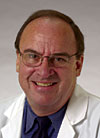 The connection between sleep disturbances
and traumatic events was the subject of a
piece on ABCNews.com. Another Dartmouth
sleep medicine expert, Thomas Mellman,
was quoted as saying that a traumatic event
can disturb sleep in several ways. "A person
might feel the need to be alert or on guard.
And being alert is basically incompatible
with being asleep," he said.
"Also, worry and intrusive
thoughts, such as disturbing
images of what happened,
might interfere
with sleep. . . . Similarly,
there are certain startle
mechanisms that can actually
operate within sleep. . . . Finally, particularly
intense, life-threatening experiences
can affect what one dreams about."
The connection between sleep disturbances
and traumatic events was the subject of a
piece on ABCNews.com. Another Dartmouth
sleep medicine expert, Thomas Mellman,
was quoted as saying that a traumatic event
can disturb sleep in several ways. "A person
might feel the need to be alert or on guard.
And being alert is basically incompatible
with being asleep," he said.
"Also, worry and intrusive
thoughts, such as disturbing
images of what happened,
might interfere
with sleep. . . . Similarly,
there are certain startle
mechanisms that can actually
operate within sleep. . . . Finally, particularly
intense, life-threatening experiences
can affect what one dreams about."
If you would like to offer any feedback about this article, we would welcome getting your comments at DartMed@Dartmouth.edu.
